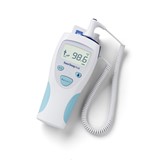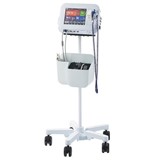Yet each day, at least three Australians is diagnosed with it.
Oral cancer is aggressive and if not detected early, sufferers only have a 50% chance of surviving past five years.
This Dental Health Week, Dental Health Services Victoria (DHSV) wants all Victorians to know how to prevent this deadly disease.
Oral cancers include cancers of the oral cavity, mouth and lip. In Australia, 51% of oral cancers in women and 57% in men are caused by smoking. Excessive alcohol intake is also a major risk factor and people who smoke and drink alcohol regularly are even more risk.
Adjunct Professor Hanny Calache, Director Clinical Leadership, Education and Research at DHSV says that while there is no cure for oral cancer, we can reduce our risk of developing the disease by embracing a healthier lifestyle.
"Making better lifestyle choices can play an enormous part in reducing the number of oral cancer cases in Australia. If a smoker who doesn't already have oral cancer stops smoking, they will halve their risk of developing oral cancer within five years."
"Oral cancers are also about six times more common in drinkers than in non-drinkers. Reducing alcohol consumption will help to prevent the development of oral cancers, especially when combined with quitting smoking," Prof Calache said.
As well as taking positive steps towards a healthier lifestyle, people should be aware of the early signs of oral cancers and seek professional advice if they see any noticeable changes in their dental or general health. With early diagnosis and positive lifestyle changes, the percentage of oral cancer sufferers surviving past five years can rise from 50% to 80%.
Professor Mike Morgan, Executive Director Oral Health Leadership at DHSV, encourages all Victorians to be proactive in maintaining their dental health and to look for signs of a potential problem.
"It is important for patients to monitor their oral health and know when something is wrong. The earlier oral cancer is detected, the less extensive the treatment and the more likely they are to make a full recovery. Patients should also be seen by their local oral health professional regularly to rule out any other dental health issues."
Symptoms of oral cancer may include:
- Swelling/thickening, lumps or bumps, rough spots/crusts/or eroded areas on the lips, gums, or other areas inside the mouth
- Velvety white, red, or speckled (white and red) patches in the mouth
- Unexplained bleeding in the mouth
- Numbness, loss of feeling, or pain/tenderness in any area of the face, mouth, or neck
- Sores on the face, neck, or mouth that bleed easily and do not heal within two weeks
- Difficulty chewing, swallowing, speaking, or moving the jaw or tongue
- Chronic sore throat or changes in the voice
- A change in the way teeth or dentures fit together - a change in your "bite"
- Dramatic weight loss
Patients who are concerned about the presence of these symptoms, especially if they have been apparent for more than two weeks, should see their local oral health professional for a comprehensive check up as soon as possible.
For more information about public dental services provided by Dental Health Services Victoria please go to visit www.dhsv.org.au.
Dental Health Week runs from 1 - 7 August 2011. For more information go to www.dentalhealthweek.com.au





